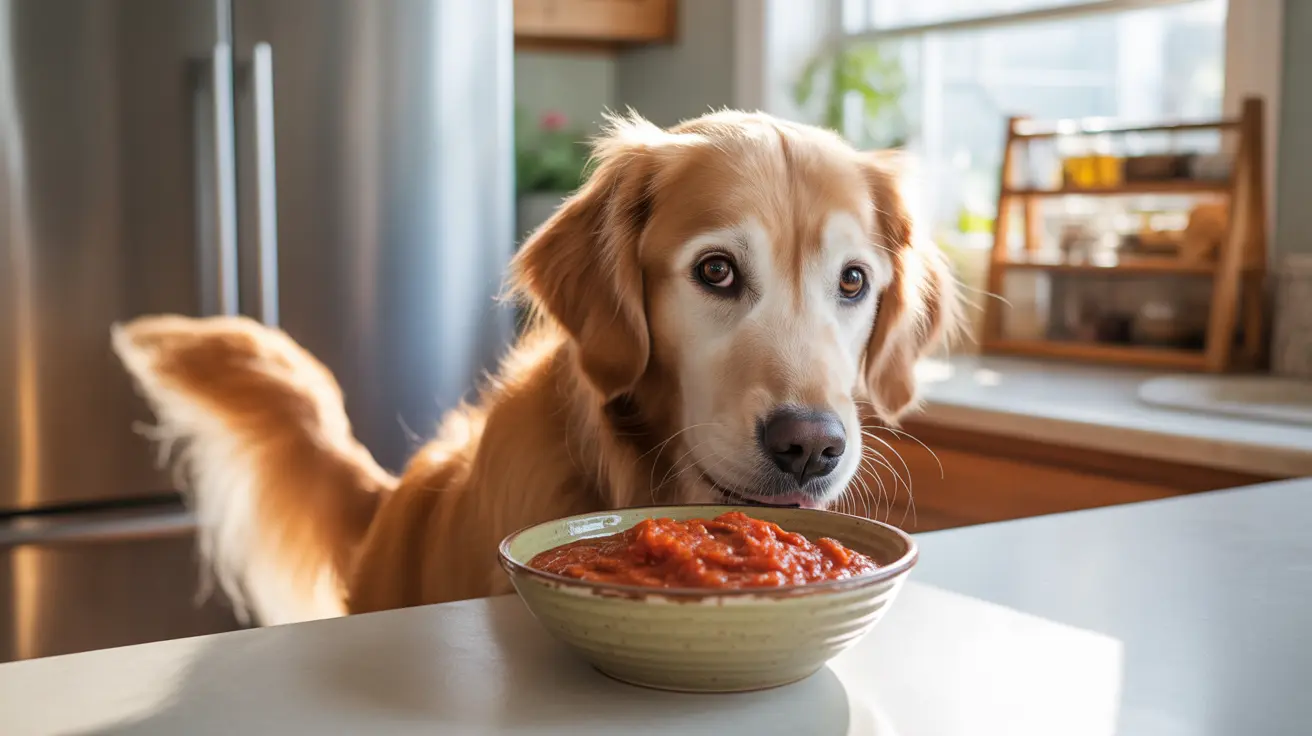Many dog owners wonder about sharing human foods with their furry friends, and tomato sauce often comes up as a question. While plain, ripe tomatoes can be safe for dogs in moderation, tomato sauce presents a more complex situation that requires careful consideration.
In this comprehensive guide, we'll explore the safety concerns, potential risks, and important factors to consider before letting your dog eat tomato sauce or any tomato-based products.
Understanding the Risks of Tomato Sauce for Dogs
Commercial tomato sauce often contains ingredients that can be harmful or even toxic to dogs. While the base ingredient - ripe tomatoes - isn't typically problematic, it's the additives and seasonings that pose the greatest risks.
Common Harmful Ingredients in Tomato Sauce
Most store-bought tomato sauces contain several ingredients that can be dangerous for dogs:
- Onions and garlic (toxic to dogs)
- Excessive salt (can lead to sodium poisoning)
- Added sugars or artificial sweeteners
- Herbs and spices that may cause digestive upset
- Preservatives and artificial additives
The Truth About Dogs and Red Sauce
When it comes to red sauce (marinara or pasta sauce), the concerns are similar to regular tomato sauce. These products typically contain additional seasonings and ingredients that could harm your dog, including:
- Italian herbs that might cause stomach upset
- High sodium content
- Potentially harmful spices and seasonings
- Acidic ingredients that could cause digestive issues
Safe Alternatives and Proper Feeding Guidelines
If you want to share tomato-based products with your dog, consider these safer alternatives:
- Plain, ripe tomatoes (in small amounts)
- Homemade tomato sauce without seasonings
- Dog-specific foods that contain tomato products
- Small amounts of low-sodium tomato paste diluted with water
When to Seek Veterinary Care
If your dog consumes tomato sauce, watch for these warning signs:
- Vomiting or diarrhea
- Excessive thirst or urination
- Lethargy or weakness
- Signs of allergic reaction
- Unusual behavior or discomfort
Frequently Asked Questions
Can dogs eat tomato sauce or red sauce, and is it safe for them?
Most commercial tomato sauces are not safe for dogs due to harmful ingredients like onions, garlic, salt, and spices. Plain, homemade tomato sauce without additives might be safe in very small amounts, but it's best to avoid feeding dogs any tomato sauce.
What ingredients in tomato sauce are toxic to dogs and why?
The most dangerous ingredients in tomato sauce are onions and garlic (which can cause hemolytic anemia), excessive salt (leading to sodium poisoning), and certain spices or sweeteners like xylitol that can be toxic to dogs.
How can I safely feed tomatoes or tomato sauce to my dog at home?
If you want to feed your dog tomatoes, stick to fresh, ripe tomatoes in small amounts. Remove all green parts and seeds. For sauce, only use plain, homemade versions without any seasonings or additives, and limit portions to small amounts as an occasional treat.
What should I do if my dog eats tomato sauce with onions or garlic?
If your dog consumes tomato sauce containing onions or garlic, contact your veterinarian immediately. Monitor for symptoms like lethargy, pale gums, weakness, or vomiting, which could indicate toxic reaction.
Are there any nutritional benefits to feeding my dog tomatoes, and how should I serve them safely?
Ripe tomatoes contain beneficial nutrients like lycopene, vitamin C, and potassium. To serve safely, offer small pieces of fresh, ripe tomatoes as an occasional treat, ensuring all green parts are removed. Always introduce new foods gradually and in small amounts.
Conclusion
While dogs can technically eat plain, ripe tomatoes in moderation, tomato sauce poses significant risks due to common ingredients that can be harmful or toxic to our canine companions. The safest approach is to avoid feeding your dog tomato sauce altogether and stick to their regular, balanced dog food diet.
If you want to share tomato-based treats with your dog, consult your veterinarian first and consider safer alternatives like fresh, ripe tomatoes in minimal amounts.






